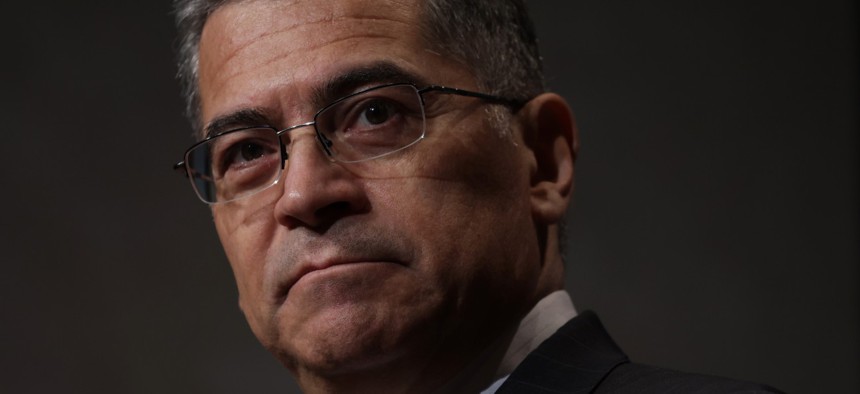
HHS Secretary Xavier Becerra said the emergency declaration will take the response to the next level. Alex Wong/Getty Images
The HHS Declares Monkeypox a Public Health Emergency
This comes after weeks of pressure as the virus spread throughout the country.
The Biden administration has declared a public health emergency for monkeypox after much pressure to do as the outbreak has rapidly spread throughout the country.
California, Illinois, New York (state), New York City and San Francisco have declared their own public health emergencies and the World Health Organization has declared monkeypox a global health emergency. There are currently about 6,600 reported monkeypox cases in the United States, public health officials said on Thursday.
“I will be declaring a public health emergency on monkeypox,” said Health and Human Services Department Secretary Xavier Becerra, during a briefing on Thursday. “We are prepared to take our response to the next level in addressing this virus as we urge every American to take monkeypox seriously.”
Robert Fenton, who was named White House National Monkeypox Response Coordinator earlier this week, said “this public health emergency will allow us to explore additional strategies to get vaccines and treatments” out as well as “allow us to get more data from jurisdictions, so we can effectively track and attack this outbreak.”
Access to data from states and other jurisdictions has been a challenge in the federal response to this outbreak.
The briefing came after The New York Times reported on Wednesday that “the shortage of vaccines to combat a fast-growing monkeypox outbreak was caused in part because the Department of Health and Human Services failed early on to ask that bulk stocks of the vaccine it already owned be bottled for distribution.”
Meanwhile, officials on the call touted the vaccines they’ve been able to secure and make available as well as expansion of testing and education efforts, particularly for men who have sex with men as they are most at risk.
Dr. Robert Califf, commissioner of the Food and Drug Administration, said HHS is working with the manufacturer of the JYNNEOS vaccine to accelerate the availability of additional doses as fast as possible. In the meantime, they are considering a “dose-sparing” strategy to make more vaccine doses available, while not compromising safety or efficacy of the vaccines. They expect to make a decision on this in the next few days.
Rep. Carolyn Maloney, D-N.Y., chairwoman of the House Oversight and Reform Committee, commended Becerra for following her call to make the public health emergency declaration.
“This critical step will allow the Biden administration to build on the progress it has already made to expand the availability of vaccines, testing, and treatment nationwide,” she said in a statement. “As chairwoman of the Committee on Oversight and Reform, I will continue to push the administration to use every tool at its disposal to mitigate the threat monkeypox poses to our nation’s public health and ensure testing, vaccines, and treatment are available to those who need it.”
Shortly before the briefing, Sen. Richard Burr, R-N.C., ranking member of the Senate Committee on Health, Education, Labor and Pensions, blasted HHS’ response to the monkeypox outbreak, arguing in a statement the department is “repeating the exact same mistakes they made during the pandemic: painfully slow to begin testing, wholly disorganized in distributing vaccines and treatments, and messaging that’s confusing and outdated. HHS appears to have learned nothing from the tragedy of the last three years.”







